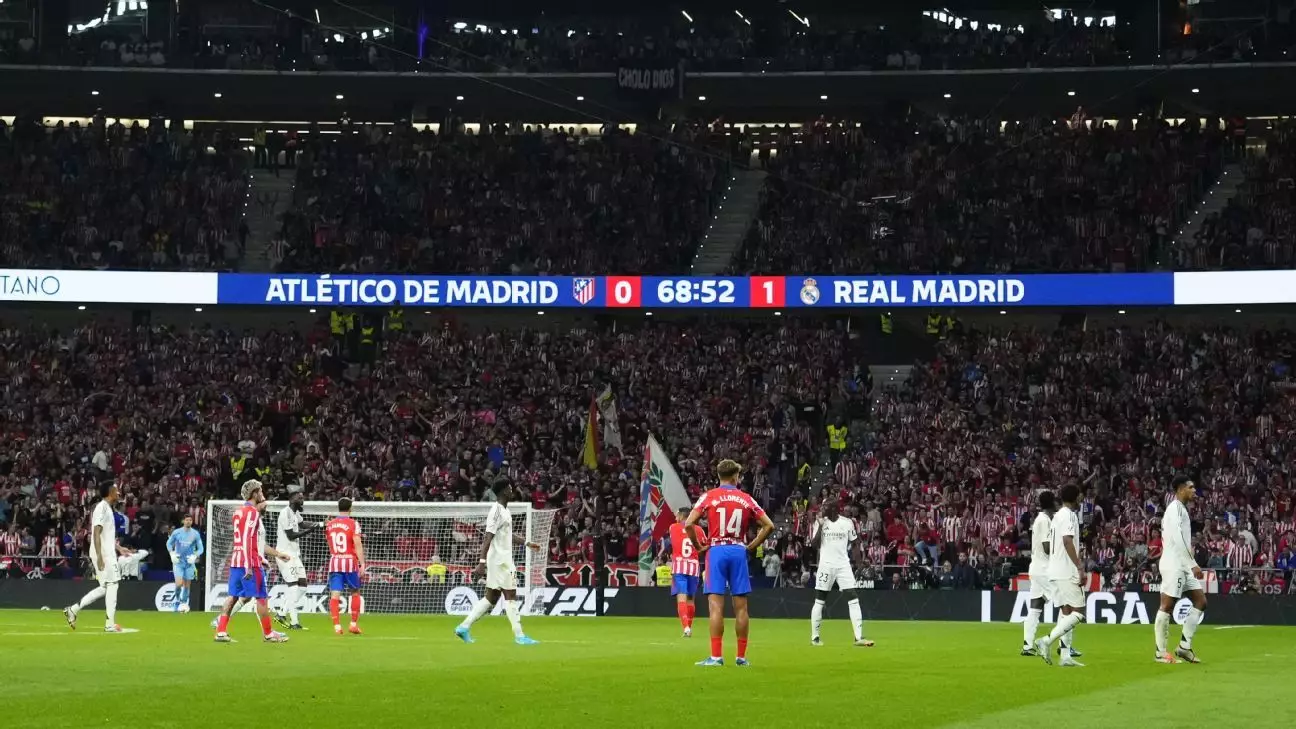The intense rivalry between Atlético Madrid and Real Madrid often ignites fervent passion within the Metropolitano Stadium. However, the recent derby held just before 10:30 p.m. local time took a disquieting turn as fan behavior spiraled out of control, casting a shadow over the event. The match was suspended with 20 minutes still remaining, following a series of incidents that revealed both the fire of passion that defines football and the dark undercurrents that can overshadow it.
The turning point in this electrifying encounter came shortly after Real Madrid’s Éder Militão scored in the 64th minute. Celebrations shortly soured as disgruntled Atlético fans began hurling objects towards the field, specifically targeting Real’s goalkeeper, Thibaut Courtois. The former Atlético player, who was met with disdain upon his goal celebration, became the focal point of a chaotic scene when lighters and plastic bottles were aimed at him. This behavior escalated to the point where the refereeing team, led by Mateo Busquets Ferrer, felt compelled to intervene.
This intervention was no trivial matter; the referee swiftly addressed the situation in partnership with the coaching staff from both teams. The fact that warnings were broadcasted multiple times exemplifies the gravity of the issue at hand. Fans were advised that if the behavior continued, the match would be immediately suspended. Unfortunately, the warnings landed on deaf ears, as escalated incidents necessitated that the teams retreat to the locker rooms as a precaution.
Upon returning after a brief delay, the atmosphere in the stadium remained charged yet markedly subdued. The energy that typically electrifies derby matches seemed compromised, serving as a stark reminder that the beautiful game can be tainted by unsavory actions from a small faction of supporters. Post-match media interactions revealed a noteworthy shift in accountability from the players and coaches. More than just condemning the fans’ actions, Atlético coach Diego Simeone and team captain Koke remarked on the necessity for players to consider their own actions and reactions. Their sentiment resonated with an understanding that while fans have individual responsibilities, players too contribute to the environment that leads to such behavior.
“Think about the club, think about your team,” Simeone reminded, urging fans to reflect on their conduct. Meanwhile, Koke offered a pragmatic viewpoint suggesting that players must be more astute in their emotional expressions, particularly during critical moments of the match. It’s a concerted call for mutual respect between athletes and fans, emphasizing the role that each party plays in the greater narrative of a match.
In the days following the derby, Atlético Madrid released a statement condemning the actions of the fans involved and committing to cooperate with local authorities. This response signifies more than just a momentary reaction; it reflects an urgent need for clubs to adopt clearer stances and policies on fan conduct. Despite the enthusiastic, electric atmosphere that football embodies, moments like these force clubs into uncomfortable territories and require them to reckon with their communities.
The actions of a few can easily be misattributed to the whole, risking reputational damage for teams that strive to foster unity. The fervor that fuels rivalries should not blur the lines of appropriate behavior. Ideally, passionate support should remain enthusiastic while also respecting the boundaries of sportsmanship and civility. The episode serves as a troubling reminder of how quickly a moment of delight can devolve into chaos, leading to potentially dire consequences.
As the dust from the incident begins to settle, it is crucial for stakeholders in the world of football to engage in meaningful reflection about the nature of rivalry and its impact on fans. While players are often seen as the protagonists in these narratives, the responsibility for maintaining a respectful environment cannot rest solely on their shoulders. Fans, players, and clubs must work collectively to ensure that the spirit of the game is upheld, free from the toxic behaviors that can seep in during high-stress situations.
Moving forward, it is essential not just to address the impact of object throwing but to understand the cultural dynamics at play during matches. Dialogue between clubs, players, and supporters is vital in shaping a more positive atmosphere that honors both the passion of the sport and the dignity of all those involved. Football, after all, should always remain a source of joy, unity, and communal pride.
